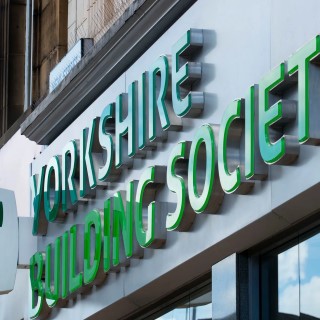Fixed mortgage rates dropped below 5% for the first time since July.

• Yorkshire Building Society has unveiled an enticing five-year fixed-rate deal at 4.99%.
• Current data indicates that five-year swap rates hover around 4.56%, hinting at potential rate decreases.
• However, the Bank of England’s impending decision, scheduled for Thursday, will determine whether the base rate will surge to 5.5%.
• Fixed-rate mortgages have dipped below the 5% mark for the first time since early July, offering a glimmer of hope to homeowners facing financial challenges. • Yorkshire Building Society offers a compelling 4.99% fixed-rate option, catering to prospective homebuyers and those seeking to remortgage. • This offer applies to loans at 75% loan-to-value, making it accessible to eligible customers with a minimum of a 25% deposit or equivalent equity in their homes.
• For instance, individuals with a £200,000 mortgage can anticipate monthly payments of £1,168 over a 25-year term, a notable reduction compared to the market average of £1,249 per month. • It’s worth noting that this five-year deal entails a £1,495 fee. However, it’s prudent for some customers to consider mortgages with slightly higher rates but lower fees for a potentially better overall package.
• Following Yorkshire BS, Virgin Money offers the next best deal with a five-year fixed rate at 5.07%, exclusively available to homebuyers with a minimum 35% deposit (equivalent to 65% loan-to-value). • HSBC also presents an enticing option with a five-year fixed rate at 5.09%, tailor-made for homebuyers who can muster a minimum 40% deposit (60% loan-to-value).
• Nationwide chimes in with a 10-year fixed-rate option at 5.04%, accessible to homebuyers boasting a 15% deposit or more (equivalent to 85% loan-to-value).
• Currently, the average five-year fixed mortgage rate is 5.67%, according to Rightmove.
• Rachel Springall, a finance expert at Moneyfacts, lauds the Yorkshire Building Society for launching such competitive deals. She notes that borrowers seeking low-rate mortgages will find this sub-5% five-year fixed deal to be the most enticing option in its category.
• Moreover, the incentive packages accompanying these new deals are expected to appeal to borrowers seeking to minimize the upfront costs of their mortgages.

Why are mortgage rates experiencing a decline? The decision by Yorkshire BS to reduce rates, including a substantial reduction of up to 0.46 percentage points on its 95% loan-to-value deals, can be attributed in part to the fierce competition among lenders. HSBC, for instance, has slashed its mortgage rates by an average of 0.15 percentage points today, accompanied by rate reductions across its buy-to-let range, with reductions of up to 0.3 percentage points. Other prominent lenders, such as Coventry BS, Nationwide BS, Accord, Generation Home, Barclays, and Clydesdale Bank, have also implemented rate cuts in recent weeks. These adjustments are further influenced by market expectations regarding the trajectory of interest rates.
Market sentiment is mirrored in swap rates, which are agreements wherein two counterparties, often banks, commit to exchanging a future stream of fixed-interest payments for a future stream of variable payments based on a predetermined amount. Mortgage lenders enter into these agreements to shield themselves from the interest rate risk of offering fixed-rate mortgages. In simpler terms, swap rates provide insight into the financial sector’s expectations regarding future interest rates. Currently, five-year swaps hover around 4.56%, a decrease from 4.74% at the beginning of the month. It’s worth noting that just a short while ago, in July, five-year swaps exceeded 5%. Similarly, the two-year swap rate now stands at 5.21%, compared to approximately 6% in July.

Ben Merritt, the director of mortgages at Yorkshire Building Society, attributes this week’s decision to the favourable market swap rates. These rates allowed us to reduce our mortgage costs and provide significant incentives to those who often face the greatest challenges: individuals with limited deposits, including first-time buyers.
 • Yorkshire Building Society has unveiled an enticing five-year fixed-rate deal at 4.99%.
• Current data indicates that five-year swap rates hover around 4.56%, hinting at potential rate decreases.
• However, the Bank of England’s impending decision, scheduled for Thursday, will determine whether the base rate will surge to 5.5%.
• Fixed-rate mortgages have dipped below the 5% mark for the first time since early July, offering a glimmer of hope to homeowners facing financial challenges. • Yorkshire Building Society offers a compelling 4.99% fixed-rate option, catering to prospective homebuyers and those seeking to remortgage. • This offer applies to loans at 75% loan-to-value, making it accessible to eligible customers with a minimum of a 25% deposit or equivalent equity in their homes.
• For instance, individuals with a £200,000 mortgage can anticipate monthly payments of £1,168 over a 25-year term, a notable reduction compared to the market average of £1,249 per month. • It’s worth noting that this five-year deal entails a £1,495 fee. However, it’s prudent for some customers to consider mortgages with slightly higher rates but lower fees for a potentially better overall package.
• Following Yorkshire BS, Virgin Money offers the next best deal with a five-year fixed rate at 5.07%, exclusively available to homebuyers with a minimum 35% deposit (equivalent to 65% loan-to-value). • HSBC also presents an enticing option with a five-year fixed rate at 5.09%, tailor-made for homebuyers who can muster a minimum 40% deposit (60% loan-to-value).
• Nationwide chimes in with a 10-year fixed-rate option at 5.04%, accessible to homebuyers boasting a 15% deposit or more (equivalent to 85% loan-to-value).
• Currently, the average five-year fixed mortgage rate is 5.67%, according to Rightmove.
• Rachel Springall, a finance expert at Moneyfacts, lauds the Yorkshire Building Society for launching such competitive deals. She notes that borrowers seeking low-rate mortgages will find this sub-5% five-year fixed deal to be the most enticing option in its category.
• Moreover, the incentive packages accompanying these new deals are expected to appeal to borrowers seeking to minimize the upfront costs of their mortgages.
• Yorkshire Building Society has unveiled an enticing five-year fixed-rate deal at 4.99%.
• Current data indicates that five-year swap rates hover around 4.56%, hinting at potential rate decreases.
• However, the Bank of England’s impending decision, scheduled for Thursday, will determine whether the base rate will surge to 5.5%.
• Fixed-rate mortgages have dipped below the 5% mark for the first time since early July, offering a glimmer of hope to homeowners facing financial challenges. • Yorkshire Building Society offers a compelling 4.99% fixed-rate option, catering to prospective homebuyers and those seeking to remortgage. • This offer applies to loans at 75% loan-to-value, making it accessible to eligible customers with a minimum of a 25% deposit or equivalent equity in their homes.
• For instance, individuals with a £200,000 mortgage can anticipate monthly payments of £1,168 over a 25-year term, a notable reduction compared to the market average of £1,249 per month. • It’s worth noting that this five-year deal entails a £1,495 fee. However, it’s prudent for some customers to consider mortgages with slightly higher rates but lower fees for a potentially better overall package.
• Following Yorkshire BS, Virgin Money offers the next best deal with a five-year fixed rate at 5.07%, exclusively available to homebuyers with a minimum 35% deposit (equivalent to 65% loan-to-value). • HSBC also presents an enticing option with a five-year fixed rate at 5.09%, tailor-made for homebuyers who can muster a minimum 40% deposit (60% loan-to-value).
• Nationwide chimes in with a 10-year fixed-rate option at 5.04%, accessible to homebuyers boasting a 15% deposit or more (equivalent to 85% loan-to-value).
• Currently, the average five-year fixed mortgage rate is 5.67%, according to Rightmove.
• Rachel Springall, a finance expert at Moneyfacts, lauds the Yorkshire Building Society for launching such competitive deals. She notes that borrowers seeking low-rate mortgages will find this sub-5% five-year fixed deal to be the most enticing option in its category.
• Moreover, the incentive packages accompanying these new deals are expected to appeal to borrowers seeking to minimize the upfront costs of their mortgages.
 Why are mortgage rates experiencing a decline? The decision by Yorkshire BS to reduce rates, including a substantial reduction of up to 0.46 percentage points on its 95% loan-to-value deals, can be attributed in part to the fierce competition among lenders. HSBC, for instance, has slashed its mortgage rates by an average of 0.15 percentage points today, accompanied by rate reductions across its buy-to-let range, with reductions of up to 0.3 percentage points. Other prominent lenders, such as Coventry BS, Nationwide BS, Accord, Generation Home, Barclays, and Clydesdale Bank, have also implemented rate cuts in recent weeks. These adjustments are further influenced by market expectations regarding the trajectory of interest rates.
Market sentiment is mirrored in swap rates, which are agreements wherein two counterparties, often banks, commit to exchanging a future stream of fixed-interest payments for a future stream of variable payments based on a predetermined amount. Mortgage lenders enter into these agreements to shield themselves from the interest rate risk of offering fixed-rate mortgages. In simpler terms, swap rates provide insight into the financial sector’s expectations regarding future interest rates. Currently, five-year swaps hover around 4.56%, a decrease from 4.74% at the beginning of the month. It’s worth noting that just a short while ago, in July, five-year swaps exceeded 5%. Similarly, the two-year swap rate now stands at 5.21%, compared to approximately 6% in July.
Why are mortgage rates experiencing a decline? The decision by Yorkshire BS to reduce rates, including a substantial reduction of up to 0.46 percentage points on its 95% loan-to-value deals, can be attributed in part to the fierce competition among lenders. HSBC, for instance, has slashed its mortgage rates by an average of 0.15 percentage points today, accompanied by rate reductions across its buy-to-let range, with reductions of up to 0.3 percentage points. Other prominent lenders, such as Coventry BS, Nationwide BS, Accord, Generation Home, Barclays, and Clydesdale Bank, have also implemented rate cuts in recent weeks. These adjustments are further influenced by market expectations regarding the trajectory of interest rates.
Market sentiment is mirrored in swap rates, which are agreements wherein two counterparties, often banks, commit to exchanging a future stream of fixed-interest payments for a future stream of variable payments based on a predetermined amount. Mortgage lenders enter into these agreements to shield themselves from the interest rate risk of offering fixed-rate mortgages. In simpler terms, swap rates provide insight into the financial sector’s expectations regarding future interest rates. Currently, five-year swaps hover around 4.56%, a decrease from 4.74% at the beginning of the month. It’s worth noting that just a short while ago, in July, five-year swaps exceeded 5%. Similarly, the two-year swap rate now stands at 5.21%, compared to approximately 6% in July. Ben Merritt, the director of mortgages at Yorkshire Building Society, attributes this week’s decision to the favourable market swap rates. These rates allowed us to reduce our mortgage costs and provide significant incentives to those who often face the greatest challenges: individuals with limited deposits, including first-time buyers.
Ben Merritt, the director of mortgages at Yorkshire Building Society, attributes this week’s decision to the favourable market swap rates. These rates allowed us to reduce our mortgage costs and provide significant incentives to those who often face the greatest challenges: individuals with limited deposits, including first-time buyers.




